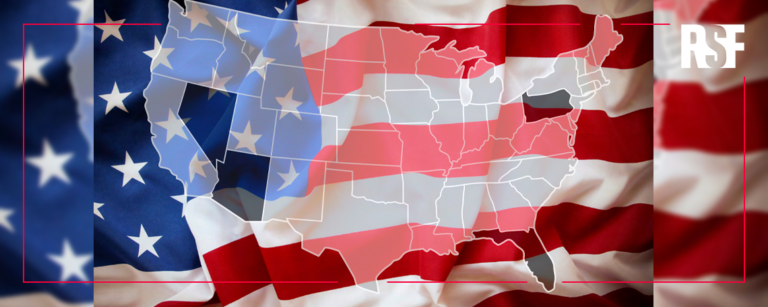In 2024, the United States ranked 55th in RSF. World Press Freedom IndexIt’s down 10 places from last year. RSF’s new report, Press Freedom in Battleground States: The Climate of American Journalism Ahead of the 2024 Election, examines the state of press freedom in four key battleground states ahead of the 2024 presidential election. . The report examines the situation in Arizona, Florida, Nevada, and Pennsylvania across five categories: political, legal, sociocultural, economic, and security, using research conducted by journalists and media experts in each state. .
According to the report, these four states:
- Nearly all survey respondents (94%) said they believe public officials delay or ignore public records requests.
- 66% of journalists and media professionals agreed that it is difficult to earn a living wage as a journalist.
- 75% agreed that “the average media is struggling for financial survival.”
The full report is available for download below.
“The RSF report finds that as the 2024 elections approach, journalists and media professionals in swing states are raising serious concerns about their industry, including economic concerns, increasingly vicious political attacks, and obstruction by public officials. There can be no democracy without a free press, which is why it’s so important to understand the challenges facing the press in the most important arena of the American presidential election. RSF says this report is a starting point for all Americans to demand improvements to their states’ media ecosystems, including greater transparency, better access to information, and markets that allow journalism to thrive. I look forward to that.”
clayton weimers
RSF US Executive Director
The RSF report also reveals:
- Nevada received the highest scores across the board.
- Arizona had the worst political score of the four states analyzed, reflecting the anti-media hostility of local political officials.
- Florida’s status as a massive news desert directly impacts the state’s free press environment, with more than 300,000 Floridians lacking local news sources. The state has no press shield law and its anti-SLAPP laws are very vague, putting journalists at risk.
- Pennsylvania news organizations are facing financial hardship, and journalists are unable to earn a living wage. They also face the most intense hostility from the public and elected officials.
RSF recommendations
The report reveals many shortcomings that impede press freedom in these four states. Some of these problems can be solved through policy reform. Lawmakers in all four states should work to strengthen media access to public records by ensuring that offices tasked with responding to public records requests are adequately funded and staffed. . Establish a simple, consistent process with clearly articulated timelines. Improve the training of personnel tasked with processing and responding to these requests, including training specific to working with journalists and news organizations. and lead by example at the political level to encourage a culture of transparency.
The deterioration of economic conditions in the news is also a key concern of this report. The proliferation of news deserts poses a serious challenge to the democratic capacity of all states, not just the battleground states studied here. Many states are experimenting with new policies and models for funding local journalism. No single model provides a one-size-fits-all solution. Instead, the Legislature will innovate new models, including increased public funding, tax refunds on news subscriptions, and policies that ensure social media companies adequately compensate news outlets for the use of their content. I have to find a way.
The report’s findings further emphasize the need for U.S. political leaders to do more to strengthen press freedom. R.S.F. 10-point plan for press freedom He identified ways the next presidential administration could improve press freedom and restore America’s status as a world leader in this area, and urged both presidential candidates to do so if elected.

